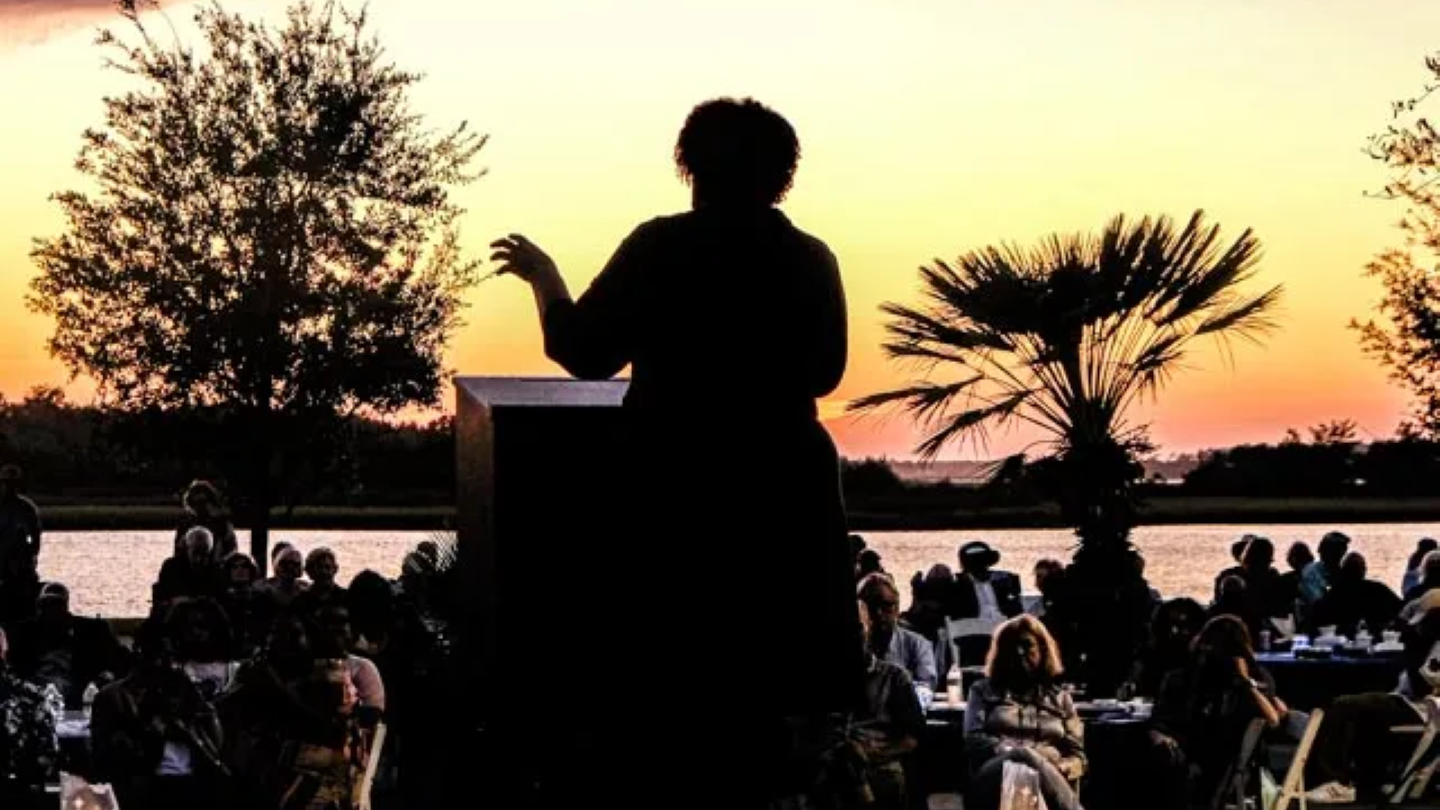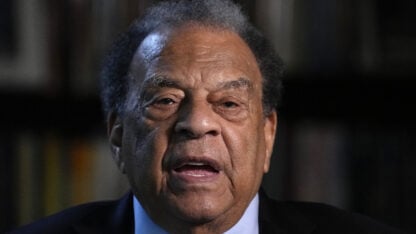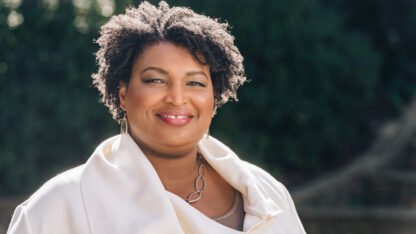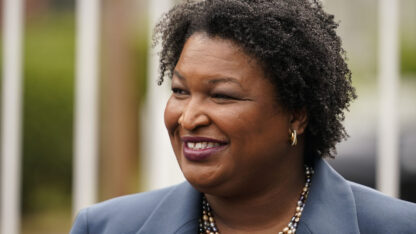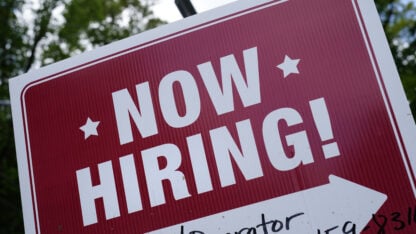The unmistakable profile. The finger jab in the air. The soaring calls to action. The legion of mobile phone-clutching admirers asking for selfies.
Despite the reminders that Stacey Abrams remains one of Georgia’s most prominent and compelling Democrats — exceeded perhaps only by U.S. Sen. Raphael Warnock — it’s what she didn’t say to Glynn County Democrats during a recent speech in Brunswick that was most noteworthy.
There were no reflections on her two devastating election losses to Brian Kemp. No traces of agonizing soul-searching, second-guessing, or self-pity. No signs of seeking to reinvent herself, as American politicians and celebrities are often wont to do after public failure or humiliation.
There were no clues, either, about why the 49-year-old former minority leader in the Georgia House of Representatives and first Black woman ever to deliver a response to a State of the Union address didn’t take a top post in the Biden Administration — or even if she was offered one.
On top of that, there were no promises to take time out from her academic responsibilities (she holds an endowed chair on race and Black politics at Howard University in Washington, D.C.) or her book-writing (she’s authored six books, most recently “Rogue Justice,” a fiction thriller published in May) to campaign for Joe Biden, Kamala Harris, or any other Democrat in next year’s elections.
Most notably of all, Stacey Abrams in her speech didn’t offer the slightest hint of an answer to the question that arises almost every time her name is mentioned among Democrats in Coastal Georgia, elsewhere in the state, and beyond: Will she run for public office again?
Along with the excitement that her passion rouses among Democrats, it’s the mystery about her future political plans that trails her everywhere.
“I know she’s not going to fade away,” Vicki Greene, second vice-chair of the Glynn County Dems, said before Abrams stepped to the podium at Brunswick’s Mary Ross Waterfront Park on the last day of September. Still, said Greene, “I thought she’d be in Biden’s cabinet.”
‘The storm coming’
Though Abrams did nothing to dispel the riddle about her political future, here’s what she did do: She delivered a speech befitting someone who still views herself as a leader in the Georgia Democratic Party, someone who’s still determined, as she boldly declared more than 12 years ago, to turn Georgia a “gorgeous shade of blue.”
She’d come to Glynn County to help build the party in Coastal Georgia, a region of the state that’s decidedly red, if not scarlet, where Donald Trump defeated Joe Biden by 12% of the vote in 2020, and she was trounced by Brian Kemp by nearly 398,000 votes two years later.
So, to an audience of some 300 people — including Democrats from Camden, Liberty, Bryan, and Chatham — she undertook the rituals of local party-building, dutifully thanking Glynn County party officials, both current and past, for their service. She teased state Rep. Al Williams (District 168) about their time together serving in the state House.
She praised Glynn Democrats for protecting coastal waterways and for urging justice in the “egregious and evil murder” of Ahmaud Arbery, a 25-year-old Black man who was chased by three white men in pickups as he jogged through nearby Satilla Shores subdivision and shot to death in 2020.
While those who killed Arbery were brought to justice, what precipitated his murder “remains in the veins of this place,” she said, urging support for the residents of Hog Hammock on Sapelo Island in neighboring McIntosh County.
The community’s residents, descendants of the slaves who worked the island, are now fighting the recently amended zoning regulations that threaten to price them out of their homes and off their land.
It was only near the end of her 15-minute speech, after her nods to local party figures and local concerns and after imploring the local party faithful to keep proving that “everything is possible,” that Abrams veered from her role as party-builder and turned to next year’s presidential election and the cause that helped vault her to national prominence: voter registration.
Warning about “the storm coming in 2024” — an obvious reference to Trump, the presumptive Republican nominee in next year’s presidential election — she beseeched the audience to rally their friends and neighbors to the polls to stave off the former president’s return to the Oval Office.
“Voting isn’t magic; voting is medicine. And the ills that assail us aren’t going anywhere unless we take that medicine over and over and over again.”
Two words
Two words that didn’t cross Abrams’ lips during her speech: “Brian” and “Kemp.”
It was an odd omission, considering the vitriol they exchanged during last year’s campaign and the place they’re fated to share in the political history of Georgia and the South.
An election victory in 2018 or 2022 would have made Abrams Georgia’s first Black governor and America’s first Black woman governor. Instead, Kemp won, in an election in which the candidates spent more than $167 million.
The closest Abrams came to criticizing her political nemesis on Saturday was to deplore the state’s failure to use its roughly $16 billion budget surplus to expand Medicaid, the joint federal and state program that helps people who can’t afford medical care pay for some or all of their medical bills.
As of June 30, Georgia was one of 10 states that hadn’t expanded Medicaid eligibility to include individuals and families earning up to 138% of the federal poverty line — or $20,120 annually for a single person and $41,400 for a family of four.
Instead, Kemp has limited expanded coverage to adults earning up to 100% of the poverty line — $14,580 for a single person or $30,000 for a family of four. And coverage is only available if able-bodied adults document they are working, volunteering, studying or in vocational rehabilitation for 80 hours per month.
In another indirect swipe at Kemp, Abrams also insisted that district attorneys across the state should have the “discretion to say that this is someone who could make a better day if we give them another chance.”
In May, Kemp signed into law a bill establishing an oversight commission with the power to remove county prosecutors who “refuse to uphold the law.”
And last week, a Fulton County judge cleared the way for the panel to start investigating complaints about district attorneys, rejecting arguments by four district attorneys that the panel unconstitutionally undermines the discretion of local prosecutors and the will of the voters who elected them.
‘A third chance’?
Although his name was absent from Abrams’ speech, Kemp looms large in the speculation over her political prospects.
U.S. Sen. Jon Ossoff presumably will run for re-election in 2026. So, presumably, will Warnock in 2028. That leaves the governor’s office, which Kemp is barred by state law from running for again.
Yet despite the enthusiasm that Abrams can still rouse among Democrats wherever she goes — “She knows how to connect to the people who are here,” said Marie Younjin, 79, of St. Simons — whether she is a viable candidate for federal or state office in Georgia in 2026 or beyond is far from clear.
For one thing, there’s the fact that Kemp’s margin of victory over Abrams increased statewide from 1.8% of the vote in 2018 to 7.5% four years later.
Coastal Georgia was no better for Abrams. She won only two of the region’s 14 counties in 2018 and 2022 — Chatham and Liberty. More indicative was Glynn, where Kemp carried 64.5% of the vote to her 35.6% in 2018 and a 66.8% of the vote to her 32.3% four years later.
Abrams gave no indication on what lessons she and her advisers have drawn from last year’s election.
After her speech, however, one attendee noted that among some Democratic Party officials and operatives, there’s a view that Abrams and her campaign faltered badly in the final weeks of last year’s race against Kemp and that her election loss was at least partly self-inflicted.
U.S. political history is, of course, replete with examples of defeated political candidates who, after a sojourn in the political wilderness, enjoyed great political success — Richard Nixon and Ronald Reagan, to name two at the presidential level.
But how and when to seek political office again is tricky. With the passage of time, the “loser” tag will carry less potency among voters. But reenter prematurely — before the “loser” tag loses its sting and is replaced by the “great American comeback” story — and you risk yet another defeat.
A recent poll carried out by Democratic strategist Chris Huttman of 20-20 Insight, LLC and obtained by the Atlanta Journal-Constitution showed Georgia voters almost evenly divided over Abrams, with 49% giving her an unfavorable rating compared to 47% who had a positive view. Kemp had a 51% favorable rating, compared to a 43% unfavorable.
Among likely Democratic voters, a slim majority — 52% — said Abrams “deserves a third chance” to run for governor. But roughly one-third said it was time to look for a new Democratic nominee.
Unfinished business
After her speech, Abrams hurried from the podium, obliging with selfies a few admirers who had scurried after her before she slipped into a chauffeured late-model SUV and drove into the night.
She had shown that her charisma and celebrity among grassroots Democrats are undimmed. So are her oratorical skills and ability to excite a crowd. But until she sheds some light on her political plans, there will be a note of puzzlement, too.
“She definitely has a political future, but I’m not sure whether it’s at the state or federal level,” said Younjin, of St. Simons, as the crowd scattered.
So, too, will linger the unmistakable air of unfinished business.
“She never gives up. She’s never defeated,” said Valerie Williams, a 56-year-old school administrator in Brunswick. “She never talks about defeat — it’s what we can do next.”
The last word on Abrams, it’s safe to conjecture, hasn’t been written.
This story was provided by WABE content partner The Current.
